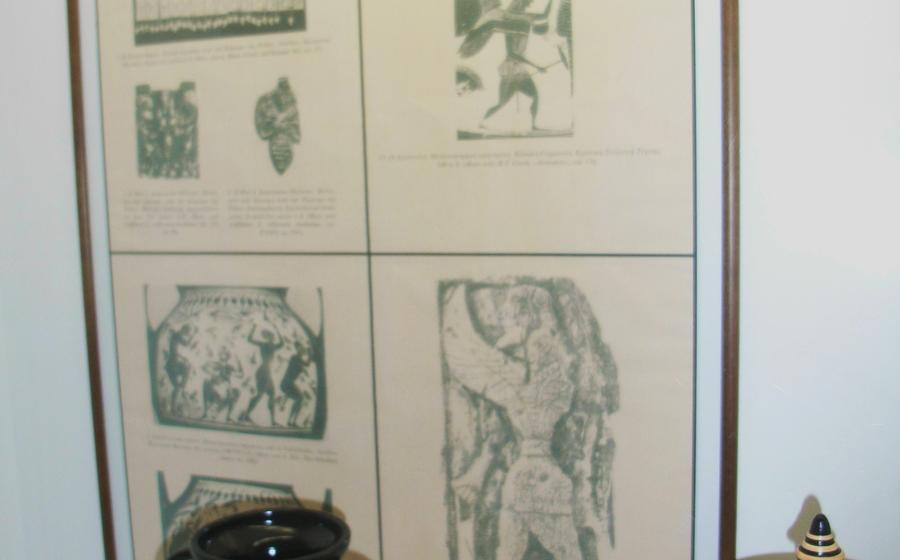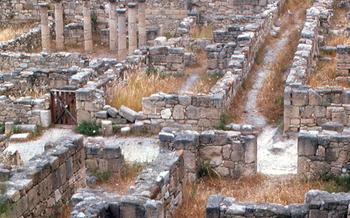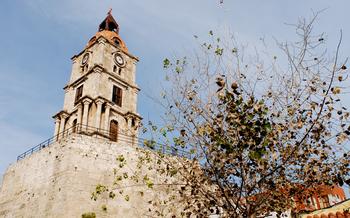
The Bee Museum
- The Bee Museum: A Unique Attraction in Rhodes
- Exploring the Museum: A Journey into the World of Bees
- Apiculture in Rhodes: A Longstanding Tradition
- Honey Production in Rhodes: A Taste of Tradition
- The Bee Museum Shop: A Treasure Trove of Bee-Themed Delights
- Guided Tours: Unveiling the Secrets of the Bee World
- Beekeeping Workshops: Hands-On Experience with Bees
- Educational Programs: Nurturing Future Bee Enthusiasts
- Seasonal Events and Activities: Celebrating the World of Bees
- Sustainability and Conservation: Protecting the Bees
- Local Beekeepers: The Heart of the Beekeeping Tradition
- Honey Tasting Experiences: Savoring the Flavors of Rhodes
- Bee-Themed Recipes: Incorporating Honey into Your Cuisine
- Photography Opportunities: Capturing the Beauty of Bees
- Insider Tip: Securing the Perfect Bee Museum Experience
The Bee Museum: A Unique Attraction in Rhodes
Nestled in the heart of Rhodes, the Bee Museum stands as a testament to the island's rich beekeeping heritage and the importance of bees in the local ecosystem. Founded in 1984 by a passionate beekeeper named Nikos Kritikos, the museum has grown from a humble collection of beekeeping artifacts into a world-class attraction that draws visitors from around the globe.
Located in the picturesque village of Pastida, just a short drive from Rhodes Town, the Bee Museum is easily accessible by public transportation or rental car. Surrounded by lush gardens and fragrant orange groves, the museum offers a serene and educational environment for visitors to delve into the fascinating world of bees.
Home to an extensive and diverse collection of exhibits, the Bee Museum showcases the history, culture, and science of beekeeping in Rhodes. From ancient beekeeping tools to interactive displays on bee behavior and honey production, the museum offers a comprehensive and engaging experience for visitors of all ages.
Exploring the Museum: A Journey into the World of Bees
The Bee Museum in Rhodes offers a captivating and immersive experience, allowing visitors to delve into the fascinating world of bees. Interactive exhibits and displays bring the world of these buzzing creatures to life, providing a deeper understanding of their biology, behavior, and significance. Visitors can witness the intricate workings of a beehive through transparent observation windows, marvel at the variety of bee species showcased, and learn about the vital role bees play in pollination and the environment.
Educational programs and workshops are conducted regularly, offering hands-on experiences and expert insights into beekeeping practices. Enthusiasts can participate in honey extraction demonstrations, learn about the art of queen bee rearing, and witness the remarkable process of honeycomb construction. The museum's knowledgeable staff is passionate about sharing their expertise, ensuring that visitors leave with a newfound appreciation for the intricate world of bees.
Apiculture in Rhodes: A Longstanding Tradition
Apiculture, the practice of beekeeping, holds a significant place in the history and culture of Rhodes. The island's unique climate and diverse flora have fostered a thriving beekeeping tradition that dates back centuries. Local beekeepers have long harnessed the natural resources of Rhodes to produce honey of exceptional quality and flavor.
Traditional beekeeping methods in Rhodes have been passed down through generations and are still widely practiced today. Beekeepers often rely on locally crafted wooden beehives, known as "melikes," which are designed to mimic natural bee habitats and provide optimal conditions for honey production. These traditional beehives are often placed in strategic locations, such as fields of wildflowers or near citrus groves, to ensure access to abundant nectar sources.
The bees of Rhodes play a crucial role in the island's ecosystem, contributing to the pollination of local flora and supporting biodiversity. Their tireless work helps to maintain the delicate balance of the island's natural environment.
Rhodes' beekeepers are passionate about preserving their traditional practices and sharing their knowledge with others. Visitors to the Bee Museum can learn about the history of apiculture in Rhodes, the unique techniques employed by local beekeepers, and the importance of bees in the island's ecosystem.
Honey Production in Rhodes: A Taste of Tradition
Rhodes is renowned for its rich beekeeping tradition and the production of high-quality honey. The island's unique climate, diverse flora, and abundance of wildflowers create an ideal environment for bees to thrive.
Beekeepers in Rhodes have been practicing their craft for centuries, using traditional methods passed down through generations. They skillfully tend to their beehives, ensuring the well-being of the bees and the production of delicious honey.
The variety of honey produced in Rhodes is impressive, ranging from light and delicate wildflower honey to darker, more robust thyme honey. Each type possesses distinct flavors and aromas, reflecting the diverse nectar sources found on the island.
Rhodian honey is highly prized for its exceptional taste and quality. Its rich, complex flavors are a testament to the skill and dedication of local beekeepers. Whether enjoyed on its own, as a natural sweetener, or as an ingredient in traditional Rhodian dishes, the honey produced on the island is a true culinary delight.
Supporting local beekeepers is essential for preserving this vital tradition. By purchasing Rhodian honey, visitors can directly contribute to the sustainability of beekeeping on the island and support the livelihoods of local beekeepers.
The Bee Museum Shop: A Treasure Trove of Bee-Themed Delights
Step into the Bee Museum shop, an alluring treasure trove dedicated to all things bees. This delightful space offers a captivating array of bee-related products, guaranteed to satisfy the curiosity and enthusiasm of every visitor. Explore the shelves adorned with a diverse selection of honey varieties, each boasting unique flavors and origins. Discover an assortment of bee-themed souvenirs, including handcrafted pottery, vibrant artwork, and charming jewelry. Indulge in sweet temptations with honey-infused chocolates, delectable honey cakes, and refreshing honey beverages. By supporting the museum and local beekeepers through your purchases, you not only acquire treasured keepsakes but also contribute to the preservation of this age-old tradition.
Guided Tours: Unveiling the Secrets of the Bee World
To delve deeper into the fascinating world of bees and apiculture, guided tours are available at the Bee Museum. Led by knowledgeable and passionate guides, these tours provide an immersive experience that unveils the secrets of the bee world. Conducted in various languages, the tours cater to a diverse audience, ensuring that visitors from all corners of the globe can appreciate the museum's exhibits.
With their expertise, the guides bring the museum's collection to life, sharing captivating stories and insights about the life and behavior of bees. They navigate visitors through the interactive displays, explaining the significance of each exhibit and answering any questions that may arise.
During the guided tour, visitors gain a deeper understanding of the importance of bees in our ecosystem and the vital role they play in pollination. They learn about the challenges bees face, including habitat loss and climate change, and the museum's ongoing efforts to promote bee conservation.
Whether you're a seasoned bee enthusiast or a curious visitor seeking to learn more about these remarkable creatures, the guided tours at the Bee Museum offer an unparalleled opportunity to immerse yourself in the world of bees and discover their extraordinary contributions to our planet.
Beekeeping Workshops: Hands-On Experience with Bees
At the Bee Museum, visitors have the extraordinary opportunity to participate in hands-on beekeeping workshops, led by experienced beekeepers. These workshops offer an immersive and educational experience, allowing participants to delve into the fascinating world of bees and beekeeping.
Under the guidance of knowledgeable instructors, participants will learn about the essential aspects of beekeeping, including hive inspection techniques, honey extraction methods, and the importance of maintaining healthy bee colonies. They will also gain insights into the unique behaviors and communication patterns of bees, fostering a deeper appreciation for these remarkable creatures.
Through hands-on activities, participants will get up close and personal with bees, observing their intricate social structures and witnessing the marvels of their honey production process. They will learn how to handle beekeeping equipment safely and effectively, gaining practical skills that can be applied to their own beekeeping endeavors or simply to enhance their understanding of these vital pollinators.
Whether you are a seasoned beekeeper looking to expand your knowledge or a curious individual eager to learn more about bees, these workshops offer an unforgettable and enriching experience. Embrace the opportunity to immerse yourself in the world of bees and discover the joys and challenges of beekeeping firsthand.
Educational Programs: Nurturing Future Bee Enthusiasts
At the Bee Museum, education is a top priority. A variety of educational programs are designed to engage visitors of all ages, inspiring the next generation of bee enthusiasts and conservationists.
Interactive Activities and Workshops:
- Hands-on activities and interactive workshops allow visitors to delve deeper into the world of bees.
- Learn about bee anatomy, behavior, and their crucial role in the ecosystem through engaging and educational experiences.
- Participate in fun and interactive games that reinforce learning and foster a love for bees.
Programs for Children and Adults:
- Tailored programs cater to different age groups, ensuring that everyone can benefit from the educational opportunities offered by the museum.
- Programs for children focus on fostering curiosity and appreciation for bees, while programs for adults provide in-depth knowledge and insights.
Inspiring the Next Generation:
- The Bee Museum aims to inspire the next generation of beekeepers and conservationists by igniting a passion for these incredible creatures.
- Through interactive learning experiences, visitors gain a deeper understanding of the importance of bees and the need to protect them.
- The museum's educational programs play a vital role in shaping future generations of bee advocates.
Seasonal Events and Activities: Celebrating the World of Bees
Throughout the year, the Bee Museum hosts a variety of special events and workshops that celebrate the world of bees and engage the local community. These events provide an opportunity for visitors to learn more about bees, honey production, and beekeeping, while also enjoying fun and interactive activities.
One of the most popular events is the annual Honey Festival, held during the summer months. This festival showcases the diverse range of honey produced in Rhodes, with local beekeepers offering samples and selling their products. Visitors can also participate in honey-themed workshops, cooking demonstrations, and educational talks.
Another highlight is the Beekeeping Workshop, which offers hands-on experience with bees and beekeeping equipment. Participants can learn about the basics of beekeeping, including how to inspect a hive, extract honey, and care for bees. These workshops are led by experienced beekeepers who share their knowledge and passion for beekeeping.
For families with children, the museum offers Bee-Themed Activities, such as face painting, arts and crafts, and interactive games. These activities are designed to engage children in a fun and educational way, teaching them about the importance of bees and the role they play in our ecosystem.
By participating in these events and activities, visitors can not only learn more about bees and beekeeping, but also contribute to the museum's mission to promote bee conservation and sustainability.
Sustainability and Conservation: Protecting the Bees
The Bee Museum in Rhodes takes an active role in promoting bee conservation and sustainability. It recognizes the crucial role that bees play in our ecosystem and works to raise awareness about the threats they face. Through educational initiatives, the museum aims to inspire visitors to take action to protect these vital creatures. Interactive exhibits and workshops highlight the importance of bee conservation and provide practical tips for individuals to contribute to bee-friendly practices. The museum also emphasizes the significance of supporting sustainable beekeeping methods, encouraging visitors to choose honey produced using responsible and environmentally friendly techniques. By promoting bee conservation and sustainability, the Bee Museum plays a vital role in ensuring the well-being of bees and the preservation of their essential role in our world.
Local Beekeepers: The Heart of the Beekeeping Tradition
At the heart of the beekeeping tradition in Rhodes lie the passionate and dedicated local beekeepers who have preserved this ancient craft for generations. These individuals play a crucial role in maintaining the island's bee population, producing the renowned Rhodian honey, and promoting sustainable beekeeping practices.
Meet Yannis, a third-generation beekeeper who inherited his family's apiary and continues the tradition with unwavering dedication. As a child, he spent countless hours observing his grandfather tending to the bees and learning the intricacies of beekeeping. Today, Yannis manages over 500 hives, scattered across the island's lush countryside.
Another remarkable beekeeper is Maria, who left her corporate career to pursue her passion for bees. With a scientific background, she brings a modern approach to beekeeping, implementing innovative techniques while respecting traditional practices. Maria's apiary is renowned for producing exceptional honey varieties, each reflecting the unique flora of different regions of Rhodes.
These beekeepers and many others like them are the backbone of the beekeeping tradition in Rhodes. Their tireless efforts ensure the sustainability of beekeeping on the island, preserving the delicate balance between nature and human intervention. Supporting local beekeepers not only guarantees the availability of high-quality honey but also contributes to the preservation of a rich cultural heritage.
Honey Tasting Experiences: Savoring the Flavors of Rhodes
A visit to the Bee Museum in Rhodes is incomplete without experiencing the delightful flavors of the island's honey. Visitors can indulge in honey tasting sessions, where they are introduced to the diverse range of honeys produced in the region. From the delicate sweetness of wildflower honey to the rich, robust flavors of thyme honey, each variety offers a unique sensory experience.
During these tasting sessions, visitors learn about the different factors that influence the flavor and characteristics of honey, such as the type of flowers bees feed on, the climate, and the beekeeping methods used. They are also guided through a comparative tasting, where they can discern the subtle nuances between different honeys.
These experiences not only provide a taste of Rhodes' beekeeping heritage but also promote an appreciation for the hard work and dedication of local beekeepers. Visitors can purchase their favorite honeys directly from the museum, supporting the local economy and preserving this ancient tradition.
Some of the most popular honey varieties to try in Rhodes include:
- Wildflower honey: A light-colored honey with a delicate, floral flavor.
- Thyme honey: A darker honey with a strong, aromatic flavor.
- Citrus honey: A sweet and tangy honey with a citrusy aroma.
- Eucalyptus honey: A dark, thick honey with a strong, medicinal flavor.
Whether you're a honey enthusiast or simply looking for a unique culinary experience, the Bee Museum's honey tasting sessions are a must-do when visiting Rhodes.
Bee-Themed Recipes: Incorporating Honey into Your Cuisine
The Bee Museum offers a delightful culinary experience, allowing visitors to taste the unique flavors of Rhodian honey through a variety of bee-themed recipes. From traditional Rhodian dishes to creative modern interpretations, the museum showcases the versatility and culinary potential of honey.
One must-try recipe is the traditional melekouni, a sweet treat made with honey, sesame seeds, and spices. Visitors can also indulge in loukoumades, delicious honey-soaked doughnuts, or kataifi, a crispy pastry filled with honey and nuts.
For those seeking a unique twist, the museum offers recipes that incorporate honey into savory dishes. The honey-glazed lamb chops are a delightful combination of sweet and savory flavors, while the honey-roasted vegetables offer a healthy and flavorful side dish.
The museum's bee-themed recipes not only showcase the culinary delights of honey but also promote the use of this natural sweetener as a healthier alternative to refined sugar. Visitors can learn how to incorporate honey into their daily cooking, creating delicious and nutritious meals that the whole family will enjoy.
Whether you're a seasoned chef or just starting your culinary journey, the Bee Museum offers a treasure trove of bee-themed recipes that will inspire and delight your taste buds. So, come hungry and ready to explore the culinary wonders of honey!
Photography Opportunities: Capturing the Beauty of Bees
The Bee Museum in Rhodes presents an exceptional opportunity for photography enthusiasts to capture breathtaking images of bees and the museum's enchanting ambiance. With its carefully curated exhibits and serene natural surroundings, the museum offers a wealth of subjects to photograph.
For the best lighting conditions, plan your visit during the golden hours of sunrise or sunset, when the soft, diffused light casts a warm glow on the bees and the museum's surroundings. This is particularly advantageous for capturing close-up shots of bees in action or highlighting the museum's intricate architecture.
When composing your shots, experiment with different angles and perspectives. Get down low to capture bees foraging among the flowers or climb to a higher vantage point to capture a panoramic view of the museum and the surrounding landscape.
The museum's interactive exhibits provide ample opportunities for creative photography. Capture the expressions of visitors as they engage with the displays, or focus on the intricate details of the beehives and beekeeping equipment.
Don't forget to venture outside the museum to capture the beauty of the surrounding gardens. The vibrant colors of the flowers and the gentle hum of the bees create a picturesque backdrop for your photographs.
Share your bee-inspired creations with the world on social media or through online photography platforms. Tag the Bee Museum and use relevant hashtags to connect with other bee enthusiasts and showcase the beauty of this unique attraction.
Insider Tip: Securing the Perfect Bee Museum Experience
To make the most of your visit to the Bee Museum, plan your trip for the early morning or late afternoon to avoid the midday heat and crowds. This will allow you to comfortably explore the museum's exhibits and take advantage of the beautiful natural light for photography. Allocate at least two hours for your visit to immerse yourself in the world of bees and fully appreciate the museum's offerings. Before your visit, check the museum's website or contact them directly to inquire about any special events, workshops, or guided tours that may align with your interests and enhance your experience. Additionally, consider exploring the museum's online resources, such as virtual tours, educational materials, and beekeeping guides, to further deepen your knowledge and appreciation for bees and beekeeping.









